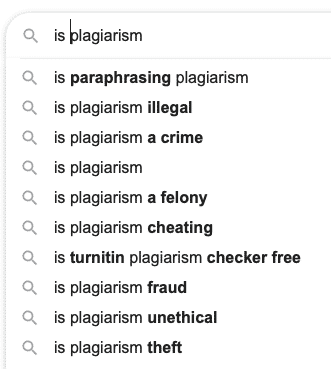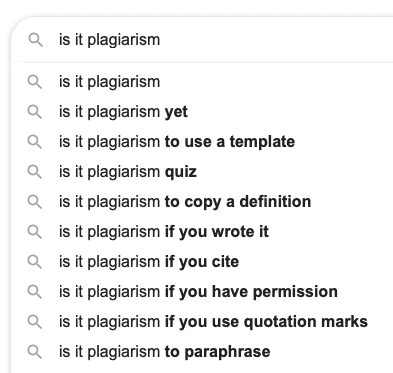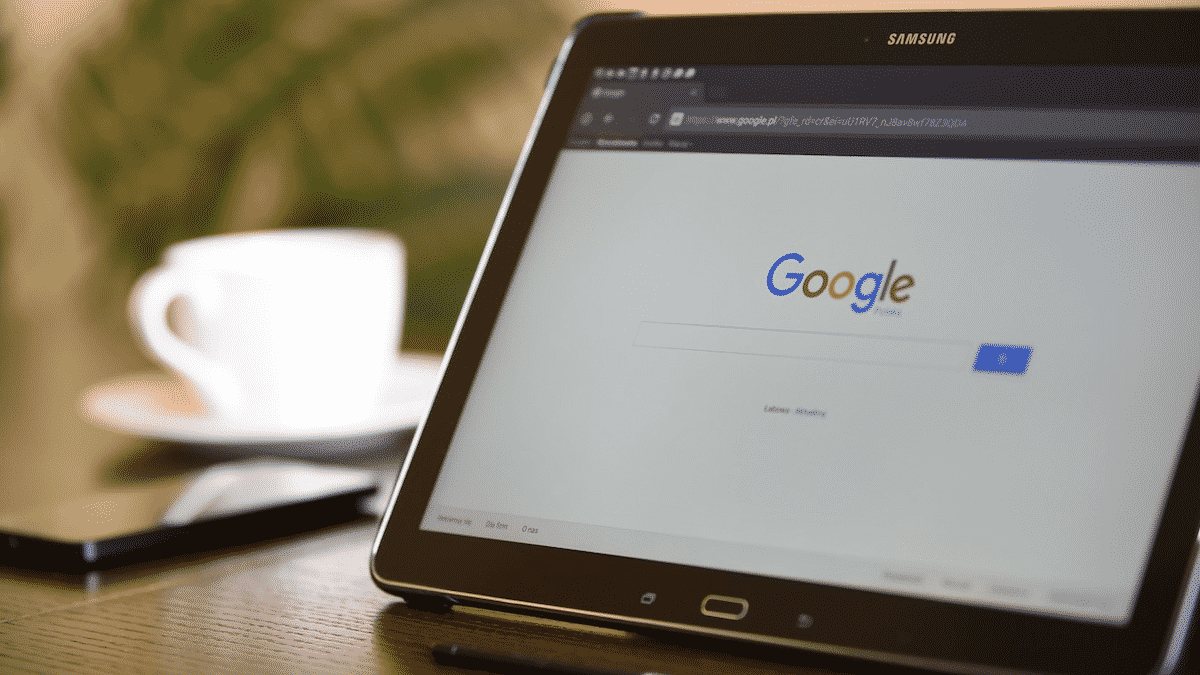Answering the Most Searched Plagiarism Questions
Answering the questions that Google gets asked...

One of the beautiful things about Google is that, through its predictions feature, it will show you what some of the most popular search terms are for a query.
This gives you an idea of what others are looking for online. This includes questions within a particular field.
Though the results are often comical, it’s important to remember that results wouldn’t be where they are if they weren’t commonly searched for, meaning that a large number of people have the question.
As such, it’s worth taking a moment to look at these questions and try to give succinct answers when possible.
So, with that in mind, I’ve decided to take a stab at answering some of the most commonly searched questions regarding plagiarism and starting with the simple queries “Is Plagiarism” and “Is it Plagiarism”
Is Paraphrasing Plagiarism? / Is It Plagiarism to Paraphrase?
Paraphrasing is putting the thoughts, ideas and information of another into your own words. Proper paraphrasing, by itself, is not plagiarism but it’s important to remember that you still need to cite the original source of the information you’re paraphrasing.
Though paraphrasing means that you avoid having to quote the original material, you still need to cite the source of the information.
Is Plagiarism Illegal? / Is Plagiarism a Crime? / Is Plagiarism Fraud?
To be clear, there no crime of plagiarism and you can’t be sued for plagiarism. However, oftentimes plagiarism is illegal under different laws. Depending on what is plagiarized and how plagiarism can amount to copyright infringement. Though copyright issues rarely hinge on attribution, many types of plagiarism are also infringements. Also, plagiarism can raise fraud, contract law and other legal issues depending on the circumstance.
Despite this, plagiarism is generally treated as an ethical issue rather than a legal one. However, this doesn’t mean that, under the right circumstances, it can’t raise significant legal issues.
Is Plagiarism Cheating? / Is Plagiarism Unethical?
Pretty much always, yes. The term plagiarism implies that one is copying and failing to attribute outside of ethical boundaries. In a classroom setting it’s a breach of academic integrity the same as looking at someone else’s answers on a test. In creative and professional environments its seen as both an unethical shortcut and as depriving someone else the credit they deserve.
Plagiarism is pretty much always cheating in some capacity and, by its very nature, plagiarism is considered unethical.
Is Turnitin Plagiarism Checker Free?
No. Turnitin is a service that is paid for by schools or teachers and students to use. There is no free version of Turnitin. Students wanting to check their work with Turnitin’s software often can do so through their school’s system or can use WriteCheck. Likewise, individuals and organizations can also use iThenticate. However, neither are free.
If you are seeking a free plagiarism checker, I highly advise you to learn the signs of a shady plagiarism detection service. Proper plagiarism detection takes a lot of resources and free plagiarism checkers often comes with significant catches.
Disclosure: I am a paid blogger for Turnitin.
Is Plagiarism Theft?
The use of the word “theft” to describe unethical copying has long been hotly debated with many saying that the word theft should not be used. Others, however, point out that the term theft is often used much more broadly to describe any attempt to take something from one person.
However, those that are victims of plagiarism often describe their experience as being the victim of a theft. Couple that with the fact that the history of the word plagiarism comes from the word “plagiarus”, which meant “kidnap”, and it is easy to see why calling plagiarism ‘theft” is, at the very least, not wholly inappropriate.

Is It Plagiarism to Use a Template?
It depends on what the expectations are. In many assignments and projects, using a template is perfectly fine, in others, it isn’t.
It comes down to whether or not the audience expects that you created the template that you are using.
In general, the answer is no. Most of the time it is perfectly fine to use a template so long as you don’t use any content from it. But, if you have a reason for asking it might be best to follow up with whoever the work is for.
Is it Plagiarism to Copy a Definition?
If you cite the source of the definition: No. If you don’t: Yes.
Plagiarism is ultimately about citation and giving credit where it is due. If you cite the source of the definition and indicate that it’s a direct quote, it isn’t plagiarism. Fail to do that and it is.
Is It Plagiarism If You Wrote It?
In general, no. However, it’s important to remember that, even if you write every word of a document, you will still likely need to cite any information that you got from outside sources. For example, in my blog posts, I generally write every word but include links to where I obtained information from.
Plagiarism isn’t just about writing with your own words, it’s also about giving credit to others who helped you find the information you needed.
Is it Plagiarism if You Cite?
No. Plagiarism is ultimately about citation. If you properly cite a work (and indicate what is quoted directly) then it’s not plagiarism.
However, that doesn’t mean that you can’t misuse content in other ways. For example, if you submit an essay you found on the internet for a project but cite where it came from, you still haven’t completed the assignment and should expect, at the very least, a bad grade.
Is it Plagiarism If You Have Permission?
When discussing plagiarism, many often place the plagiarized party as the victim. Logically, if that person gives permission, then there’s no victim and there’s no plagiarism?
However, that ignores the fact that there are actually two victims of plagiarism: The person being plagiarized and the audience that is being told a lie. After all, the misdeed of plagiarism is, at its fundamental level, the lie. The plagiarist claims to have created something they didn’t. However, that lie isn’t told to the original creator, who may be unaware, it’s made to the audience.
So yes, even if you have permission, it’s still plagiarism. There are exceptions, such as when the audience doesn’t expect an original piece. We see this with the use of ghostwriters in some circumstances. However, if the audience reasonably expected an original work and presented a copied one that is labeled as original, it’s generally plagiarism. Permission from the source is irrelevant.
Is it Plagiarism If You Use Quotation Marks?
Quotation marks (along with block quotes and other indicators) are used to indicate that the words contained within them are not original and come from another source. As long as you indicate what the other source is (and the words are actually theirs) then there is no plagiarism or citation issue.
That said, quotation marks are not a magic wand to make plagiarism issues go away. You can’t copy an essay from the internet, put it in quotes and turn it in for an assignment. Quotation marks aid in citation and clarity, they aren’t a substitute for it.
Bottom Line
When it comes to plagiarism, it’s clear that there are a LOT of questions that people have. Whether they are students, creatives or professionals, there’s clearly a lot of confusion about plagiarism.
To that end, one of the best things we can do is to answer the questions that we are asked rather than being dismissive of them.
After all, the point of education is to teach and one can’t really teach if they discourage questions. As such, we should take on all of the questions we can, including those posed to us through Google searches.
Want to Reuse or Republish this Content?
If you want to feature this article in your site, classroom or elsewhere, just let us know! We usually grant permission within 24 hours.
